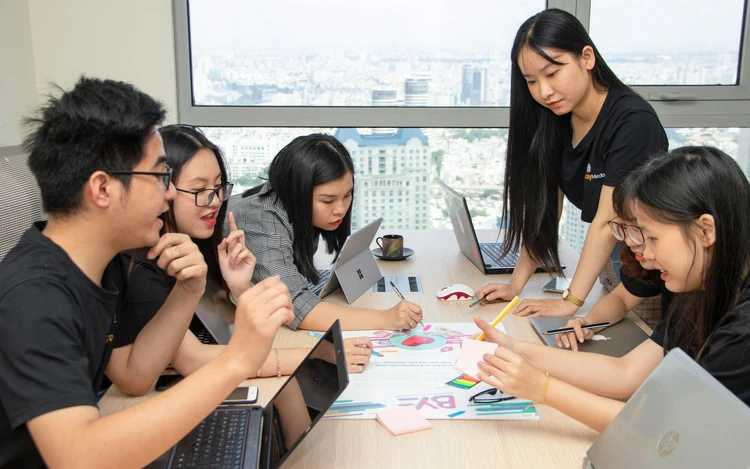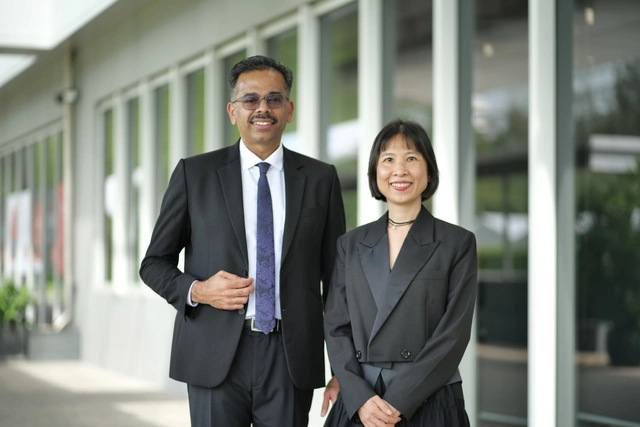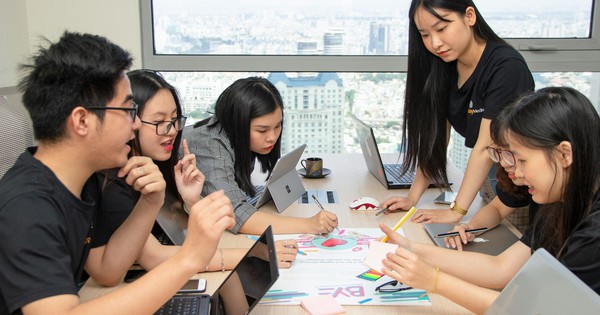
Vietnam’s startup scene is driven by a young, tech-savvy population. Photo: RMIT
A flourishing startup nation
Vietnam’s vision to become a startup hub is not a distant dream. With over 4,000 innovative startups, including ‘unicorns’ valued at over US$1 billion such as MoMo and Sky Mavis, the country is building real capacity for innovation-led growth by 2050.
“Despite a later start compared to regional peers, Vietnam’s startup ecosystem has emerged as a dynamic force,” said Dr Nguyen Thi Minh Thu, Senior Program Manager for Entrepreneurship at RMIT Vietnam. “It’s driven by a young, tech-savvy population and supportive government policies.”
In a country that is advancing toward a high-income status, entrepreneurship is more than an economic lever. It is an opportunity for young people to create their own future and for everyday problems to be solved by homegrown ideas.
In that future, a high school graduate in Lao Cai Province, northern Vietnam might create an AI-based tool to help small shop owners track sales and inventory with just a smartphone photo.
A young mother in Can Tho City, southern Vietnam could launch a digital marketplace connecting local artisans to global buyers without ever leaving her home.
What once seemed unrealistic are now possible outcomes if Vietnam builds the right environment for innovation.
Cities like Ho Chi Minh City and Hanoi are already thriving in industries such as fintech and blockchain, helped by initiatives like the Vietnam National Innovation Centre and National Program 844. The ecosystem also benefits from large domestic market opportunities, rising venture capital investments, and global trade shifts, according to Dr Justin Xavier, Senior Manager, International & Projects at The Business School, RMIT Vietnam.
Still, challenges remain. “Startups face a shortage of qualified talent and scaled ventures. More investment in education and policies to attract investors and entrepreneurs is also needed,” said Dr Xavier.
Where Vietnam’s startups could go next
By 2050, Vietnam’s startup landscape is expected to transform in ways that reflect a broader shift toward a knowledge-based economy.
Dr Thu outlines several forces driving this evolution – demographic change, digital advancements, and the country’s push toward sustainability.
“This transformation will create opportunities for startups in many industries such as e-commerce, AI, fintech, edtech, healthtech, and agritech,” she said.
“Vietnam’s pledge for net-zero emissions by 2050 will also drive startups toward energy efficiency and sustainable practices.”

Dr Justin Xavier (left) and Dr Nguyen Thi Minh Thu. Photo: RMIT
Dr Thu anticipates a future where the private sector becomes the backbone of Vietnam’s economy, with startups leading the way.
“By 2050, if we could see private conglomerates rival regional giants, driving projects like high-speed rails or digital infrastructure, and integrating deeply into global supply chains, that would be a transformative leap. It’s the promise of a self-reliant, dynamic Vietnam built on internal strength rather than external reliance,” Dr Thu said.
Building the right conditions for growth
To make this future possible, structural changes are needed.
“Vietnam must strengthen intellectual property laws to protect startup innovation and attract venture capital,” said Dr Thu.
“Export incentives and trade support can help local startups integrate into global supply chains.”
Building a stronger ecosystem is also critical. “More access to seed funding, mentorship, and incubators is needed to grow future unicorns,” she said. “We also need entrepreneurship embedded in education, and more collaboration between the ecosystem stakeholders, especially academia and industry.”
At RMIT, these ideas are already being put into practice. Through study programs focused on entrepreneurship and innovation, the university is helping students build essential skills and an entrepreneurial mindset.
In 2024, RMIT launched SPARK Hub, offering its students, alumni and the wider community a supportive ecosystem to grow and transform their startup ideas into reality.
Dr Xavier, SPARK Hub’s lead, shares that students have access to mentorship, resources, and networking opportunities through the hub.
It also runs competitions and incubation experience activities so students can apply their learning in practice.
By giving students early exposure to startup thinking, the hub empowers more young people to test ideas, build confidence, and turn creativity into action whether or not they launch a company right away.
“This comprehensive approach not only equips students with valuable skills but also strengthens Vietnam’s startup ecosystem by nurturing a new generation of entrepreneurs ready to compete on the global stage,” he said.
A future powered by local innovation
Looking ahead to 2050, both RMIT experts see entrepreneurship as a pillar of Vietnam’s national development and a pathway to economic resilience.
“The shift to a model where private startups lead in innovation, technology, and global competitiveness is such an exciting vision,” Dr Thu said.
Dr Xavier is inspired by the energy and creativity he sees in Vietnam’s youth.
“The most powerful aspect is the combination of a young, tech-savvy population and a rapidly evolving tech ecosystem,” he remark ed .
“The entrepreneurial spirit and resilience of Vietnamese startups position the country as a rising star in the global startup scene.”
And his message to aspiring founders?
“Embrace a mindset of continuous learning and adaptability. The startup world is ever-changing. Stay curious, seek out a mentor, and be ready to pivot when needed.”
Dr Thu added, “Prioritise innovation, problem solving, and resilience. Build something that can withstand change and make sustainability your focus.”
Vietnam 2050: The vision ahead is a thought leadership series powered by RMIT Vietnam’s academic experts, exploring what Vietnam could become over the next 25 years. Each article unpacks potential major shifts – from smart cities and education to tech and entrepreneurship – offering predictions and ideas for a future-ready nation.

